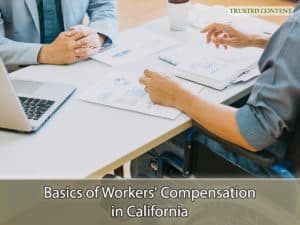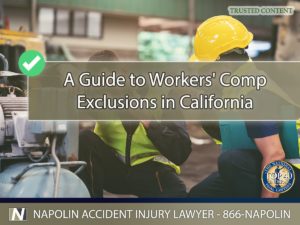A Guide to Workers’ Compensation Exclusions in California
Workers' Compensation in California serves as a crucial safety net for employees who suffer injuries or illnesses due to their job. This system aims to provide necessary financial and medical support, ensuring workers are not left to bear the burden of work-related injuries alone. However, not all workers fall under the umbrella of this protection. Understanding who is excluded from Workers' Compensation is vital for both employees and employers. This knowledge helps in identifying the need for alternative protections or insurance solutions.

Basics of Workers' Compensation in California
Basics of Workers' Compensation in California
Workers' Compensation is a state-mandated insurance program that provides benefits to employees injured or who become ill due to their job. It is designed to cover medical expenses, provide disability benefits, and support the injured worker's return to work. This system also benefits employers by limiting their liability in case of workplace injuries. However, the scope of this coverage is not all-encompassing, leading to certain exclusions. It's important to understand these exclusions to fully grasp the extent of Workers' Compensation in California.
General Eligibility Criteria for Workers' Compensation
In California, Workers' Compensation typically covers most employees, from full-time to part-time and sometimes even temporary workers. The primary criterion for eligibility is that the injury or illness must be work-related. Coverage is usually automatic and begins from the first day of employment. However, despite these broad criteria, there are notable exceptions that leave some workers without this coverage.
Standard Eligibility Requirements for Workers' Comp
To be eligible for Workers' Compensation, an individual must be an employee, and the injury or illness must be directly related to their job. This includes injuries sustained while performing work duties or illnesses developed due to work conditions. The system is designed to be straightforward, ensuring that those who qualify receive timely support.
Common Scenarios of Covered Injuries and Employees
Covered injuries in Workers' Compensation range from sudden accidents, like falls or equipment-related injuries, to cumulative injuries developed over time, such as repetitive strain injuries. Most employees, regardless of their job title or industry, are covered under this system, provided their injury is job-related.

Understanding Who is Excluded in California Workers' Compensation
Understanding Who is Excluded in California Workers' Compensation
Despite the comprehensive nature of Workers' Compensation, certain categories of workers are typically excluded from coverage in California. These exclusions are based on the nature of employment and other specific criteria. Knowing who falls outside this coverage is essential for understanding the full landscape of Workers' Compensation.
Specific Categories of Workers Typically Excluded
The most common categories of workers excluded from Workers' Compensation include independent contractors, volunteers, and federal employees. Each of these categories has specific criteria that determine their exclusion, often related to the nature of their employment contract or the jurisdiction of their employment.
Case Examples of Exclusion Scenarios
For example, a freelance graphic designer working as an independent contractor for various companies would not be eligible for Workers' Compensation through any of these companies. Similarly, volunteers who offer their services without pay are generally not covered under this system.
Common Exclusions in Workers' Compensation
Understanding the most common exclusions can help clarify who is and isn't covered under California's Workers' Compensation laws. This clarity is crucial for workers who might assume they are covered when, in fact, they are not.
Independent Contractors and Gig Workers
Independent contractors and gig workers are typically not considered employees and thus are not covered under Workers' Compensation. This distinction is crucial in the growing gig economy, where many workers may not realize they lack this coverage.
Volunteers and Unpaid Interns
Most volunteers and unpaid interns do not receive Workers' Compensation benefits, as they are not paid employees. This exclusion is significant in sectors where volunteer work is common, such as non-profits and community organizations.
Federal Employees and Certain Other Categories
Federal employees are covered under federal Workers' Compensation laws and are therefore excluded from state coverage. Other specific categories, such as certain agricultural workers or domestic workers, may also have different coverage rules.
Gray Areas and Misconceptions in Workers' Comp Eligibility
There are situations where the eligibility for Workers' Compensation is not clear, leading to misconceptions and confusion. These gray areas can be challenging to navigate without proper legal guidance.
Situations Where Eligibility is Not Clear-Cut
Cases involving subcontractors, leased employees, or workers in certain industries can present complex eligibility questions. These situations often require careful legal analysis to determine coverage.
Misconceptions About Exclusions and Eligibility
A common misconception is that part-time employees or those in non-traditional employment arrangements are not eligible for Workers' Compensation. However, this is not always the case, and each situation should be evaluated individually.
Impact of Exclusions on Injured Workers
Workers who are excluded from Workers' Compensation face unique challenges. These challenges can have significant implications on their financial stability and access to medical care.
Challenges Faced by Excluded Workers
Excluded workers, if injured on the job, may face financial difficulties due to lack of access to Workers' Compensation benefits. This can lead to a lack of proper medical treatment and financial strain due to lost wages.
Alternative Options and Protections Available
For those not covered by Workers' Compensation, alternative options such as personal insurance policies, legal claims for damages, or other state and federal benefits may be available. These alternatives can provide a safety net, though they may not offer the same level of protection as Workers' Compensation.
Legal Assistance for Excluded Injured Workers
Legal advice can be invaluable for workers who find themselves excluded from Workers' Compensation coverage. Understanding one's rights and the available options is crucial in these situations.
How a Lawyer Can Help Navigate Alternative Solutions
A lawyer can provide guidance on alternative compensation methods, such as personal injury claims or other legal avenues. They can also help navigate the complexities of determining employment status and eligibility for coverage.

A Guide to Workers' Compensation Exclusions in California
A Guide to Workers' Compensation Exclusions in California
Understanding the exclusions in Workers' Compensation coverage in California is essential for all workers. If you find yourself excluded from Workers' Compensation coverage, seeking legal advice is a critical step. Contact Napolin Accident Injury Lawyer at (866)-NAPOLIN for a free consultation. Our team is well-versed in the complexities of Workers' Compensation law and can provide the guidance and support you need to navigate your legal options in California. Whether you're facing an exclusion scenario or seeking alternative compensation methods, we are here to help you understand your rights and find the best path forward.
- Safely and Legally Navigating Parking Lots in California - July 15, 2024
- Navigating the Aftermath of a Highway Auto Accident in California - July 15, 2024
- An Overview of California's Commercial Truck Insurance Laws - July 15, 2024
